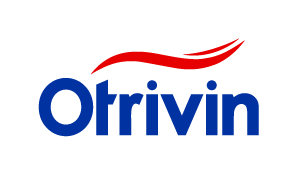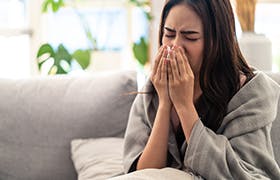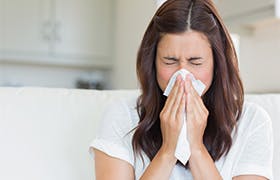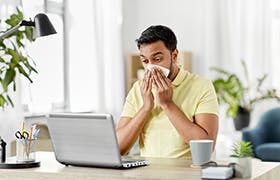
How can I help prevent air pollution?
Air pollution prevention can be achieved in many ways, ranging from levying a road tax on motor vehicles to avoiding the use of air conditioners. But while air pollution prevention is important, the first line of defence is your nose,2,3 which acts as your body’s natural filter against pollutants.2 Air pollution can damage this filter, which is why it’s so important to look after your nose.
Why should I use Otrivin Breathe Clean Daily Nasal Wash?
Otrivin Breath Clean Daily Nasal Wash helps to keep your nose clean.1 It washes away nasty pollutants in the nose, such as dust and other fine particles, helping you to breathe cleaner every day.
Tips for protecting yourself against air pollution.
- Check public health websites. These websites are there to help you check the air quality in your local area. You can use them to see the air pollution levels each day, so you know exactly what you’re dealing with. If you know the air quality outside is poor and might cause issues for your nose, you may choose to delay your plans to stay indoors until it improves.4
- Plan your day. If you live in an area where there’s heavy traffic, wherever possible, plan your regular outdoor activities outside of commuter times, to help you avoid peak air pollution levels.4
- Wear a face mask. Make sure it has a filter that can remove harmful fine particles as well as large ones.4
- Drive mindfully. If you drive, try to avoid peak times so you don’t breathe in the pollution while you’re queuing in traffic. Close your car windows to stop exhaust fumes getting in.4
- Check your furniture. Not all air pollution will come from outside the home. Surprising as it sounds, volatile organic compounds (VOC) emitted from indoor decorating and refurbishing materials, as well as wooden furniture, are recognised as some of the main causes of bad indoor air quality.5
- Consider using an air purifier. If you are very concerned about indoor pollution in your home, an air purifier could be a good option.6
Tips for air pollution prevention.
- Think about the products and appliances you use. For example, is there fossil burning involved? Even decisions such as when to use the central heating, could make a difference.4
- Drive less. Consider taking public transport or using an electric vehicle. Thinking about the carbon dioxide emission of your vehicle can also save money since the vehicle road tax you are charged can take this into account.4
- Consider appliance alternatives. For example, using an air conditioner regularly or for prolonged periods of time can contribute to global warming.7
- Use LED lights where possible. This can help to improve energy efficiency.4
References:
- Bastier PL, et al. Nasal irrigation: From empiricism to evidence-based medicine. A review. Eur Ann Otorhinolaryngol Head Neck Dis 2015;132(5):281–5.
- Shusterman D. The effects of air pollutants and irritants on the upper airway. Proc Am Thorac Soc 2011; 8(1):101–5.
- Eccles R. A role for the nasal cycle in respiratory defence. Eur Respir J 1996;9(2):371–6.
- Airmotion Laboratories. Breathe Life. Available at: https://www.airmotionlabs.com/post/breathe-life (last accessed April 2020)
- WHO Guideline for indoor air quality: Selected pollutants (pg104, 112, 113). Available at: https://www.euro.who.int/__data/assets/pdf_file/0009/128169/e94535.pdf (last accessed April 2020)
- Batterman S, et al. Particulate matter concentrations in residences: an intervention study evaluating stand-alone filters and air conditioners. Indoor Air 2012;22:235–52.
- World Health Organisation Housing Strategies. Available at: https://www.who.int/sustainable-development/housing/strategies/air-conditioning/en/ (last accessed April 2020)
Show all references
Close references









